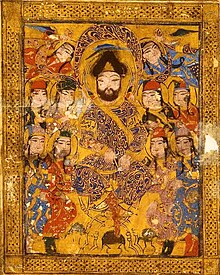
Back أبو الفرج الأصفهاني Arabic ابو الفرج الاصفهانى ARZ Əbülfərəc İsfahani AZ ابوالفرج اصفهانی AZB Абу-ль-Фарадж Аль-Ісфахані BE আবুল ফারাজ আল-ইসফাহানি Bengali/Bangla Abu-l-Faraj al-Isbahaní Catalan Abu al-Faraj al-Isfahani CY Abū l-Faradsch al-Isfahānī German Αμπού αλ-Φάρατζ αλ Ισφαχάνι Greek
This article should specify the language of its non-English content, using {{lang}}, {{transliteration}} for transliterated languages, and {{IPA}} for phonetic transcriptions, with an appropriate ISO 639 code. Wikipedia's multilingual support templates may also be used. (January 2024) |
Abu al-Faraj al-Isfahani | |
|---|---|
أَبُو الْفَرَج الْأصْفَهَانِيّ | |
 Illustration from Kitab al-aghani (Book of Songs), 1216–20, by Abu al-Faraj al-Isfahani, a collection of songs by famous musicians and Arab poets. | |
| Born | 897 Isfahan, Abbasid Caliphate |
| Died | 967 (aged 69–70)[a] |
| Other names | Ali ibn al-Ḥusayn ibn Muḥammad ibn Aḥmad ibn al-Ḥaytham |
| Era | Islamic golden age (Abbasid era) |
| Known for | Book of Songs |
| Scientific career | |
| Fields | History |
| Patrons | Sayf ad-Dawlah |
Ali ibn al-Husayn al-Iṣfahānī (Arabic: أبو الفرج الأصفهاني), also known as Abul-Faraj, (full form: Abū al-Faraj ʿAlī ibn al-Ḥusayn ibn Muḥammad ibn Aḥmad ibn al-Ḥaytham al-Umawī al-Iṣfahānī) (897–967CE / 284–356AH) was a writer, historian, genealogist, poet, musicologist and scribe. He was of Arab-Quraysh origin[1][2] and mainly based in Baghdad. He is best known as the author of Kitab al-Aghani ("The Book of Songs"), which includes information about the earliest attested periods of Arabic music (from the seventh to the ninth centuries) and the lives of poets and musicians from the pre-Islamic period to al-Isfahani's time.[3] Given his contribution to the documentation of the history of Arabic music, al-Isfahani is characterised by George Sawa as "a true prophet of modern ethnomusicology".[4]
Cite error: There are <ref group=lower-alpha> tags or {{efn}} templates on this page, but the references will not show without a {{reflist|group=lower-alpha}} template or {{notelist}} template (see the help page).
- ^ M. Nallino (1960). "Abu 'l-Faradj al-Isbahani". In Gibb, H. A. R.; Kramers, J. H.; Lévi-Provençal, E.; Schacht, J.; Lewis, B. & Pellat, Ch. (eds.). The Encyclopaedia of Islam, Second Edition. Volume I: A–B. Leiden: E. J. Brill. p. 118. OCLC 495469456.
- ^ Bagley, F. R. C. "ABU'L-FARAJ EṢFAHĀNĪ". Encyclopaedia Iranica. Archived from the original on 16 November 2011. Retrieved 2 April 2017.
- ^ Sawa, S.G. (1985), "The Status and Roles of the Secular Musicians in the Kitab al-Aghani (Book of Songs) of Abu al-Faraj al-Iṣbahānī", Asian Music, 17 (1), Asian Music, Vol. 17, No. 1: 68–82, doi:10.2307/833741, JSTOR 833741
- ^ Sawa 1989, p. 29.